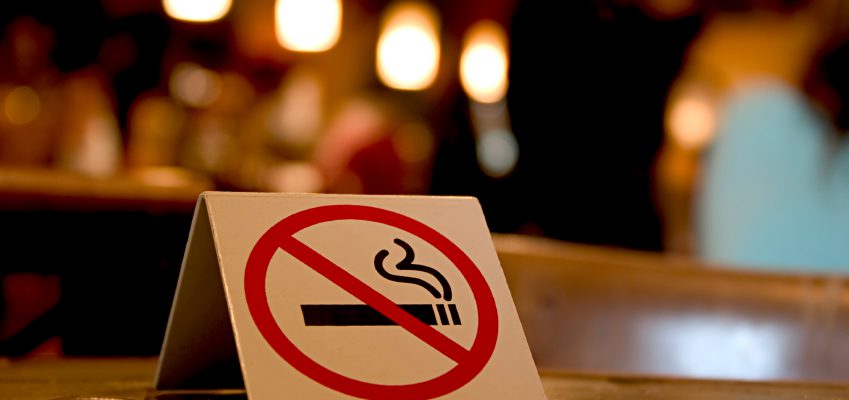Goal Area 2: Eliminating Exposure to Secondhand Smoke for People Who Do Not Smoke
Support for Smokefree Indoor Air Policies at Restaurants, Workplaces, Casinos and Clubs, and Bars
The Adult Tobacco Survey questions about smokefree indoor air policies asked adults if they think smoking should be allowed indoors at workplaces, restaurants, bars, and casinos and clubs. Casinos and clubs were combined in one item on the survey, so WYSAC treated them as a single venue type.
In 2023, most adults (88%; Figure 14) supported smokefree indoor air policies for restaurants. Most (83%) adults supported smokefree indoor air policies for workplaces. More than half (58%) of adults supported smokefree indoor air policies for casinos and clubs. More than half (57%) of adults supported smokefree indoor air policies for bars.
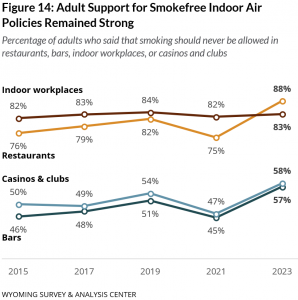
Support for indoor workplaces has remained stable since 2015. Support for smokefree indoor air policies for restaurants, casinos and clubs, and bars significantly increased between 2015 and 2023. For these venues, the increase in support from 2021 to 2023 was also significant.
Support for Other Smokefree Air Policies
Commercial Tobacco-Free School Policies
In 2023, most adults (86%; Figure 15) thought that commercial tobacco should be completely banned at schools. This support has been consistent since 2010.
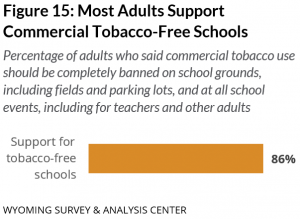
Smokefree Park Policies
In 2023, the majority of Wyoming adults (86%) thought smoking should be restricted at outdoor parks, at least in some manner. About one in three (36%; Figure 16) of adults thought that smoking should never be allowed, and half (50%) thought that smoking should be allowed only at some times or in some places. Support for any level of regulation has increased significantly since 2010 (76%).
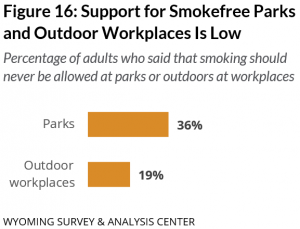
Smokefree Outdoor Workplace Policies
Support for policies making outdoor workplaces smokefree was substantially lower than support for policies making indoor workplaces smokefree. In 2023, only 19% (Figure 16) of adults supported a smokefree air policy for outdoor workplaces, compared to 83% for indoor workplaces. The level of support for such a policy has not changed significantly since 2015.
Exposure to Secondhand Smoke
Smoking Policies at Work
In 2023, most employed adults (93%; Figure 17) reported that smoking was never allowed in indoor areas (including inside a vehicle) at their place of work. This is a significant increase from 87% in 2019.
About one in three (31%; Figure 17) adults reported that smoking was not allowed in outdoor areas. This has significantly increased since 2012 (25%). Workers are better protected by smoking regulations indoors than outdoors.
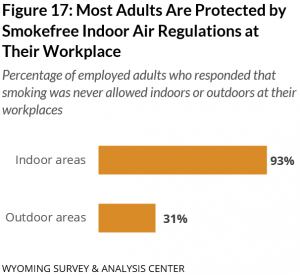
Exposure to Secondhand Smoke at Work and in Public Places
In 2023, most employed adults (83%) were not exposed to secondhand smoke at their workplace. Still, 17% of employed adults reported experiencing secondhand smoke indoors or outdoors at their workplace. There has been no significant change between 2010 and 2023.
In 2023, about one in three (34%; Figure 18) adults reported breathing someone else’s secondhand smoke in public places, indoors, and outdoors. Most adults (66%) were not exposed to secondhand smoke. Almost one in three (30%) adults reported exposure to secondhand smoke in outdoor public places. Few (11%) adults reported exposure to secondhand smoke in indoor public places. Although still a cause for concern, exposure to secondhand smoke has significantly decreased in public places, indoors or outdoors, between 2012 and 2023.
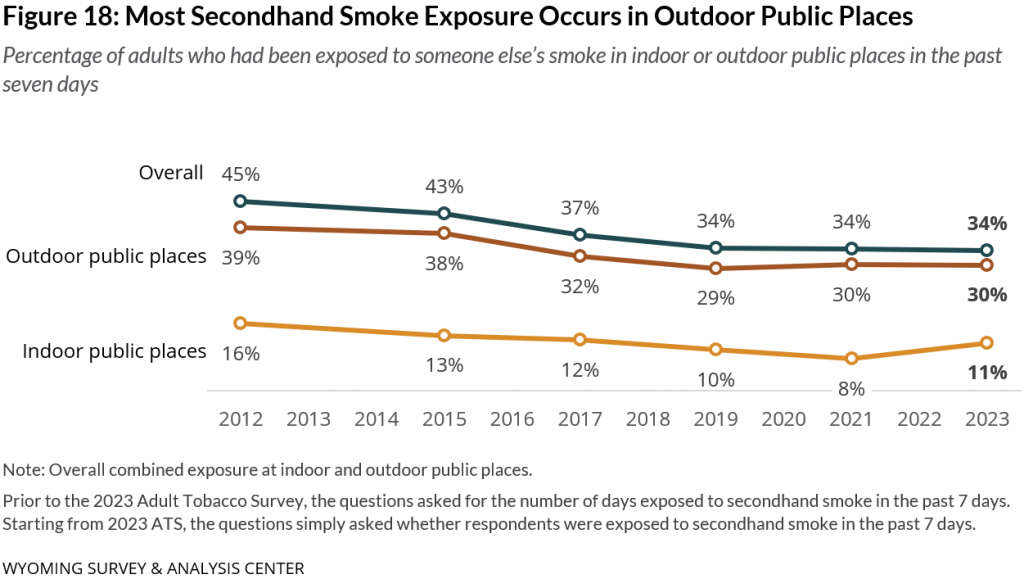
In 2023, the chances of being exposed to secondhand smoke while in a public place were not significantly different between adults who currently smoke and those who do not smoke:
- 41% of adults who currently smoke reported exposure to secondhand smoke
- 33% of adults who do not smoke reported exposure to secondhand smoke
Opinions about the Harms of Secondhand Smoke
Over the years, nearly all adults have agreed that exposure to secondhand smoke is harmful to one’s health. In 2023, 98% (Figure 19) believed secondhand smoke was very or somewhat harmful to one’s health. Only 2% believed that it was not harmful. These levels of agreement have not changed significantly between 2010 and 2023.
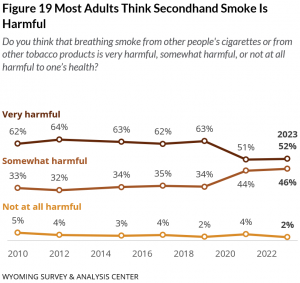
However, opinions about the harmfulness of secondhand smoke have shifted in recent years. Adults who think breathing secondhand smoke is very harmful significantly decreased between 2019 and 2023.
Conclusion
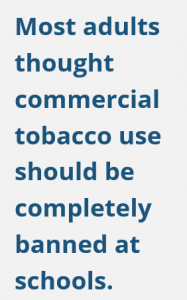 Over the years, exposure to secondhand smoke has significantly decreased in public places, indoors and outdoors. Two-thirds of adults reported not being exposed to secondhand smoke in public places, indoors or outdoors.
Over the years, exposure to secondhand smoke has significantly decreased in public places, indoors and outdoors. Two-thirds of adults reported not being exposed to secondhand smoke in public places, indoors or outdoors.
Adults have consistently and strongly supported smokefree indoor air policies for workplaces and restaurants. In addition, support for smokefree indoor air policies for casinos and clubs and bars has increased. Wyoming adults continue to support a complete ban on commercial tobacco use at schools. Most adults thought that smoking should be restricted at parks, at least in some manner. Most employed adults are not exposed to secondhand smoke at work, indoors or outdoors.
Wyoming still has room for improvement. Smoking policies in outdoor areas, including at work and in public places, are less protective of adults. Adult support for outdoor policies at work and indoor air policies at adult-oriented establishments has shown improvement. Wyoming may benefit from focusing on prevention efforts in these areas. Recent decreases in reports of seeing secondhand smoke as “very harmful” may indicate a need for revisiting education about the harms of secondhand smoke.
